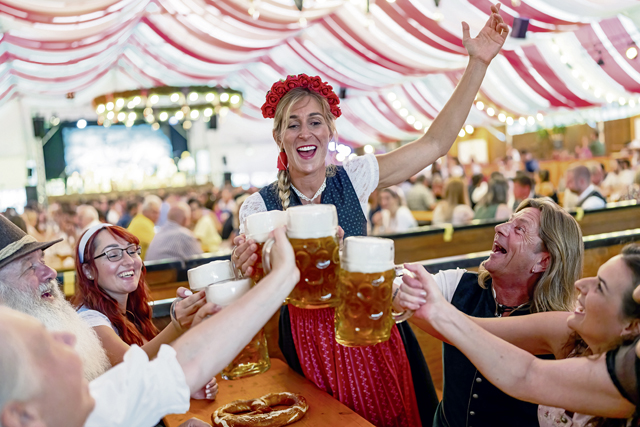
O’ ZAPFT IS!
When service members are notified of their selection for an overseas assignment, they may feel a sense of anticipation for various reasons, including the opportunity to travel and immerse themselves in a new culture.
This holds true for many service members in the Kaiserslautern Military Community, who may have missed the chance to experience an authentic Oktoberfest. This year marks the 189th celebration of Oktoberfest in Munich.
While the annual festival enjoys worldwide recognition, it is possible that many are unfamiliar with its history and how it has evolved into the celebrated event we know today.
Oktoberfest originates from Munich with the marriage of Ludwig I, the future king of Bavaria, and Princess Therese von Sachsen-Hildburghausen, Oct. 12, 1810 where celebrations lasted five days. Citizens of Munich were invited to attend the royal wedding, participate in festivities, and watch horse races.
According to the city of Munich’s website the celebration was so popular it was brought back the following year and included an agriculture fair. Many new additions were made in following years including horse races and food and drink vendors. These vendors eventually moved to beer halls in the 20th century.
Today, Oktoberfest celebrations throughout the world pay homage to the Oktoberfest in Munich. The festival is traditionally a 16 to 17-day celebration, ending on the first Sunday in October. Since 1950, the mayor of Munich has kicked-off the festival by tapping the keg. What might be a surprising fact for visitors is that the large tents are completely newly constructed with fresh timber every year and construction starts in July!
FUN FACTS:
When the Oktoberfest hosts move to the fairgrounds on Saturday, a total of 40 horses pull the magnificently decorated brewery wagons onto Theresienwiese during the parade. These horses are usually huge cold-blooded horses that can pull the heavy wagons with ease.
Only beer brewed in Munich may be served at the fest and they are Augustiner, Hacker-Pschorr, Hofbräu, Löwenbräu, Paulaner und Spaten. Locals call the fest “Wiesn,” which is derived from Theresienwiese, named after Princess Therese who married there. Locals prefer to visit the fest from Mondays – Thursdays when it’s somewhat less crowded!
Nobody raises their mug until the mayor says so! Since 1950, the festival has only started after the official gun salute and the mayor shouting O’ zapft is! (“It’s tapped!”) and offering the first mug to the Minister-President of the State of Bavaria. Only after that, the festival can start.
The hairier the hat, the wealthier the wearer. During Oktoberfest, traditional visitors wear Bavarian hats (Tirolerhüte). The more tufts of goat hair on your hat, the wealthier you are considered to be.
The beer is specially brewed for Oktoberfest and it’s extra strong. One mug of beer here is equivalent to 8 shots of Schnapps.
There’s an on-site Red Cross tent. And it’s usually full! In 2023, at least 5,800 people needed medical attention.
There are 14 large fest tents, the most famous one is Schottenhamel because it’s where the mayor taps the first keg. The biggest one is Hofbräu-Festhalle which seats almost 11,000 people.
There is also a wine tent. Besides 15 different types of wine, there’s also champagne and sparkling wine in the Weinzelt.
Albert Einstein once worked there as an electrician and helped set up one of the beer tents in 1896.
Beer mugs are popular souvenirs and guests love to take them home. But in 2023, 130,000 beer mugs were confiscated and taken back to their tent owners.
Waiters at the fest are expected to carry ten Mass glasses (one liter each), in addition to the weight of the liquid, the glasses weigh about one kilo each, adding up to 20 kilos at once!
Church and Oktoberfest? Sounds out of place. Well, a mass is held every first Thursday of the Oktoberfest in the Hippodrome tent.
Kid friendly: The idea of bringing children to a massive beer festival might seem pretty far out, but the truth is that there are hundreds of children that attend the festival every year. There are ferris wheels, roller coasters, rides, carousels, games and traditional parades. And, believe it or not, there is a lost and found children office on the premises!
Lost & Found collects around 5,000 items each year. Items include wheelchairs, baby carriages, passports, keys, crutches and dogs! And a pair of teeth are found almost every year. Wedding rings also seem to get surprisingly loose during Oktoberfest.
Americans are the most frequent foreign visitors, followed by Australians.
In 2023, 7.2 million guests visited Oktoberfest, drinking 6.5 million liters (1.7 million gallons) of beer!
Oktoberfest will be held Sept. 21 to Oct. 6 this year. Members planning to attend Oktoberfest celebrations — locally or across the country — should ensure they have a plan for transportation if drinking alcohol. Local tour operators offer package tours and special trains are also available to Munich.
Members celebrating in the local area are encouraged to have a plan and use resources available like local cab companies, public transportation, a designated driver, and their immediate supervisor. Armed Forces Against Drunk Driving is available Fridays and Saturdays between 11 p.m. and 5 a.m. Members should call AADD at 0152-5172-3356 if their original plan falls through.
Inspired? For more information about Oktoberfest, visit www.oktoberfest.de


